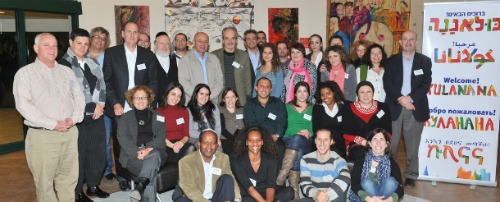
Helping people from dozens of cultures and backgrounds to feel “Israeli,” as opposed to members of their own minority group, has been one of the challenges Israel has faced since the early days of the state. Today there are still major subgroups — including Arabs, ultra-Orthodox Jews, Russian and Ethiopian immigrants, and residents of peripheral towns — who don’t truly see themselves as part of the fabric of Israel.
And while social cohesion is an issue in all immigrant societies, the problem is more acute in Israel, says Mike Prashker, chairman of Merchavim, an organization dedicated to increasing tolerance and common values among Israelis from varied backgrounds.
“There are nearly eight million Israeli citizens, and they are a diverse group, to say the least,” says Prashker.
Prashker and Merchavim have started a new program called “Kulanana,” a combination of Hebrew and Arabic words denoting unity. The program is designed to pinpoint commonalities among all Israelis.
“After a long process which included polls, questionnaires and focus groups, we discovered that there were three things everyone could agree upon as necessary for a successful society — citizenship, diversity and fairness,” Prashker tells ISRAEL21c.
Kulanana’s programs promote those values through activities such as Jewish and Bedouin kids gardening together in the Negev; youths making videos about their home communities; and first-aid classes for Arab mothers taught by members of ZAKA, the ultra-Orthodox lifesaving organization.
“We want to break down the divide that separates groups and get them to work together,” says Prashker. “We already have 15 ongoing projects, and expect to have 30 by the end of the year, when we will hold our first annual conference. By mid-2012 we expect 40 percent of Israelis between 13 and 30 to be able to recognize the name Kulanana and its programs — hopefully encouraging them to sign up for some of our activities.”
Learning to trust ‘the other’
The need for programs like Kulanana’s in Israel is urgent, says Prashker.
“For such a small country, Israel is far too divided. Kids — and adults — from various groups don’t know much about each other, and that leads to fear of ‘the other.’ Without a strong sense of identity, people tend to turn their backs on society, losing out on opportunities and denying others the benefit of the contributions they could be making to enrich the lives of others.”
The costs of a disjointed society are high, as can be seen in other countries, says Prashker. Israel, faced with many security and economic problems, just can’t afford the pressure of feuding subgroups.
For the past 15 years, Merchavim has been conducting programs in some 500 Israeli kindergartens with the cooperation of the Education Ministry. Kulanana will focus mostly on after-school programs.
“We intend to conduct many different programs under the Kulanana umbrella, and are aiming for a high degree of name recognition and identification among Israelis,” Prashker says. About a million and a half Israelis already have been exposed to Kulanana and its principles thanks to a media campaign that featured ads on last year’s season of Kochav Nolad (A star is born), Israel’s version of American Idol.
Kulanana is fully funded by its parent organization Merchavim, which in turn is supported by grants from organizations in Israel and abroad, from the Education Ministry to the UJA-Federation of New York, the Lander Israel Fund, the Bronfman and Slifker Foundations and even the US and UK governments — as well as Google, which supports the group with ads and an infrastructure for its videos via Youtube.
All these funders, says Prashker, recognize the urgent need for a more unified society in Israel.
“It’s wonderful that there is a Jewish state, but once you have that state, you have to find ways for its citizens to live and work together,” Prashker stresses. “I know we have a lot to worry about in Israel, especially from a security point of view, but the issue of citizenship is just as important. And it’s something we really need to do something about.”











